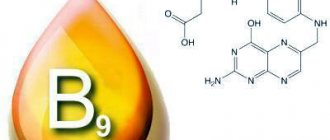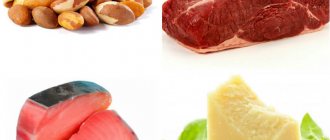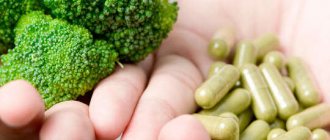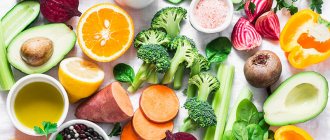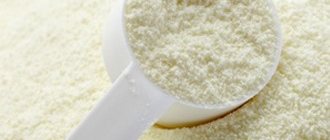Biological role of vitamin U
Vitamin U performs a number of beneficial functions in the body. First of all, it is worth noting its antiulcer activity. Even the name of this substance was given in honor of the presence of this property (“U” is the initial letter of the word “ulcus”, which means “ulcer”). The vitamin improves the healing of the mucous membrane, normalizes the acidity of gastric juice and leads to the fact that an existing peptic ulcer goes into remission.
Another very important effect is the antihistamine effect. The vitamin blocks allergic reactions and reduces the tendency to their occurrence. In this regard, a person with a corresponding predisposition will experience improvement with regular use of vitamin U.
Presumably, methylmethionine promotes the activation of the body’s self-purification systems and promotes the inactivation and elimination of harmful substances. With the participation of this substance, other biologically active compounds are formed in the body, for example, choline.
Indications and contraindications
Antiulcer factor is recommended for the treatment of the following painful conditions:
- chronic hepatitis;
- cholelithiasis;
- esophagitis;
- Parkinson's and Alzheimer's diseases;
- liver cirrhosis and Gilbert's syndrome;
- stomach ulcers and colitis;
- diabetes mellitus;
- diaphragmatic hernia;
- atherosclerosis;
- neuroses and mental disorders;
- cystitis;
- multiple sclerosis;
- chronic cholecystitis;
- obesity;
- dystrophy caused by a lack of protein in the body after dysentery;
- alcoholism;
- drug addiction;
- nicotine addiction;
- wounds, injuries acquired as a result of sports training;
- premature aging of skin and tissues.
Vitamin U is indicated for use by women to improve the condition of hair, strengthen the nail plate, improve skin tone, alleviate premenstrual syndrome and relieve chronic fatigue.
Contraindications to additional use of S-methylmethionine:
- severe liver or kidney failure;
- hypersensitivity to the components of the drug;
- viral hepatitis;
- children under 6 years old;
- hepatic encephalopathy.
Rarely, while taking methionine, patients develop side effects. These include: nausea, vomiting, allergic skin rashes, itching, unpleasant taste in the mouth and decreased blood pressure. Sometimes patients experience tachycardia and confusion. These signs of overdose disappear after adjusting the dose of the compound by the attending physician.
Signs of Vitamin U Deficiency
It is believed that when there is a lack of vitamin in the body, other biologically active substances replace it in biochemical reactions. For this reason, it is considered useful, but not essential. There are no specific symptoms of its deficiency. It is assumed that its deficiency can lead to digestive disorders and the appearance of increased acidity of gastric juice, although this has not been reliably proven. Vitamin U improves the condition of the gastrointestinal tract, but its deficiency does not necessarily cause corresponding problems.
Hypo- and hypervitaminosis of s-methylmethionine
Vitamin U is not produced by the body. It comes from external sources. The following categories are most susceptible to element deficiency:
- people whose diet includes too few fruits and vegetables;
- patients with low stomach acidity;
- people who smoke and drink a lot of alcoholic beverages spend all their energy on eliminating intoxication.
A number of responsibilities are taken on by other elements. But with a severe lack of vitamin U, unpleasant symptoms occur:
- exacerbation of pathologies of the digestive system;
- damage to the mucous membranes of the stomach;
- violation of the condition of the dermis, the appearance of rashes;
- nervousness, mood swings;
- general weakness;
- dysfunction of the liver associated with weakening of its protection.
Cases of hypervitaminosis of the substance were not recorded. Methionine is a water-soluble compound. It quickly leaves the body in urine.
Synthetic preparations based on vitamin U are less effective compared to natural sources of the element. Doctors advise eating more fruits and vegetables containing this substance.
Vitamin U: price and sale
People who have a hereditary history of peptic ulcers should definitely think about using vitamin U. Those who have increased acidity of gastric juice, who have gastritis or an already formed ulcer, are even more likely to need to take medications containing it. And even healthy people will find them useful as a means of prevention and general health.
You can buy vitamin U on our website at any time. We officially represent leading manufacturers of vitamins from Russia and abroad, offering the highest quality preparations containing vitamin U at the most favorable price for the buyer.
To purchase your chosen product, add it to your cart or call us by phone.
There is a toll-free number for regions 8 800 550-52-96.
Daily norm
The average daily volume of the substance is 200 mg. Taking into account the age and individual characteristics of the human body, this figure can be 100-300 mg.
For people who have ulcers or disorders of gastric juice synthesis, the dosage is increased by 2 times. For them, the daily norm is 400 mg.
An increase in dosage is also required for people who are actively involved in sports. In this case, the norm may be in the range of 150-350 mg.
If necessary, the drug is prescribed for oral use. Doctors usually prescribe 100 mg of the vitamin. It should be taken up to 4 times a day. The course of therapy is 1 month. A specific period is prescribed based on the characteristics of the body.
Sources of income
At its core, Methylmethionine sulfonium is indispensable for us. It is not synthesized in the body, but comes only from the outside, as part of food products of plant origin - herbs, fresh vegetables.
The “record holders” in terms of content are:
| Product | Content, mg/100 g |
| Asparagus | 260 |
| White cabbage | 85 |
| Cauliflower | 18 |
| Parsley | 20 |
| Beet | 25 |
Among other products containing vitamin. U:
But the amount of Methylmethionine sulfonium here is small, and does not exceed 1 mg. As for vegetables and fruits, it is advisable to consume all these products fresh, raw. Can be dried, frozen and canned - with loss of vit. U are minimal and do not exceed 3%.
But it is undesirable to cook, especially for a long time. During the first 10-15 minutes. Cooking destroys about 4%% vit. U. But within 1.5 hours it is completely destroyed. It is advisable to store food in a dark place. After all, it also decomposes under the influence of sunlight.
Properties
Vitamin U is a derivative of the amino acid Methionine. The chemical formula of S-methylmethionine is C5H11NO2S. Externally, it appears as white crystals with a yellowish tint with a sweetish taste and specific odor. The crystals are hygroscopic, soluble in water, but poorly soluble in alcohol and other organic solvents. S-methylmethionine is unstable to oxidizing agents, sunlight and high temperatures. However, its activity practically does not decrease upon drying and cooling.
Indications for use
In diseases of the digestive system, not only the walls of the gastrointestinal tract, but also the intestinal microflora suffer from a lack of adequate nutrition, and concomitant pathologies develop. Vitamin deficiency, which occurs in the body due to disturbances in the functioning of the stomach, and especially the small intestine, is an indication for the use of vitamin preparations.
In doses significantly exceeding the physiological needs of a person, vitamins are used as medicines under the supervision of a doctor.
For chronic pancreatitis with secretory insufficiency, gastric and duodenal ulcers, chronic gastritis, gluten enteropathy, Crohn's disease, and radiation enteritis, therapeutic concentrations of ascorbic acid are used.
Retinol is widely used for chronic gastritis, chronic enteritis, chronic pancreatitis.
For preventive purposes, multivitamins are often used, including those aimed at improving the functioning of the digestive system.
They may additionally contain the following substances:
- microelements (zinc, magnesium, potassium, calcium, etc.);
- vitaminoids (for example, vitamin U, which is an antiulcer factor);
- probiotics (lactobacteria, bifidobacteria);
- digestive enzymes.
How to understand that the intestines need vitamins
Restlessness or pain in the abdomen, changes in stool, loss of appetite, flatulence, false urge to defecate, bloating and rumbling in the abdomen - the presence of these symptoms indicates a dysfunction of the gastrointestinal tract. In this case, treatment is required, during which vitamins are prescribed.
There are also less obvious signs: deterioration in general health, weakness, irritability, drowsiness, cracks on the lips and in the corners of the mouth, acne, boils, frequent appearance of stye on the eye, bleeding gums.
Functions of normal intestinal microflora.
These symptoms indicate a deficiency of vitamins and indicate either a lack of them in food or a violation of their absorption in the intestines.
If a connection is revealed with periodic abdominal pain, flatulence, changes in stool, foul odor of stool, the cause should be sought in dysfunction of the digestive tract.
How to take the complex correctly
There is a whole set of rules that you need to know before you start taking any vitamin complex.
- It is necessary to take into account the compatibility of vitamins with each other. For example, group A substances cannot be combined with K and B12. And vitamin B12, in turn, will interfere with the “work” of ascorbic acid and pyridoxine. But vitamin E and folic acid will be more useless if taken together.
- With atrophic gastritis, chewing vitamins is prohibited. It is better to swallow the pills with plenty of water. This is not a whim of the manufacturer; such a recommendation has a completely reasonable explanation. The fact is that the acidic environment in the stomach destroys the beneficial properties of vitamins. If you swallow them, the special protective shell will not be damaged, the substance will “get” to its destination and begin to work.
- It is advisable that the course of treatment occurs in the winter and spring periods. It is at this time that the human body is most exhausted and needs to be “recharged” with vitamin cocktails.
- After you finish taking the product, you must take a break for at least 3 months.
The duration of the therapeutic course for atrophy should be determined solely by the doctor. As a rule, it lasts no more than 30 days.
Which ones can you take?
Gastritis and stomach ulcers are not diseases that can be cured by taking vitamins. However, they will be useful as an additional component of drug therapy.
Among the drugs presented in pharmacies, we advise you to pay attention to such as: Complivit, Centrum, Alphabet. They contain small doses of substances that are so necessary for atrophic gastritis and ulcerative formations.
Vitamins for gastritis are an irreplaceable thing. But in addition to multivitamin complexes, it is very important to enrich your diet with foods high in nutrients. For example, vegetable oil rich in vitamin E will speed up the process of mucosal regeneration for gastritis, and nicotinic acid normalizes the production of aggressive hydrochloric acid.
But remember that vitamins are only a minor component of the treatment program. Alas, without taking medications prescribed by a doctor, it will not be possible to overcome gastritis and ulcers.
Vitamin complexes for gastrointestinal diseases
When treating such serious diseases of the gastrointestinal tract, doctors prescribe the intake of beneficial substances. They often affect the production of hydrochloric acid and reduce the vulnerability of the diseased mucosa. For example, vitamins A are aimed at stopping the development of infection, and PP helps avoid diarrhea and optimizes the production of gastric juice. Let's take a closer look at the most important vitamin substances.
Fat soluble
- If you have low stomach acidity, then you are recommended to take Retinol, better known as vitamin A. This substance has a beneficial effect on the functioning of the immune system and normalizes the production of hydrochloric acid. Contained in green peppers, pumpkin (even more than carrots), apricot and milk. To maintain health, it is recommended to consume up to 5000ME per day.
- Vitamin E for gastritis with high acidity has proven its effectiveness. The substance neutralizes the harmful effects of hydrochloric acid and normalizes acidity. This fat-soluble biological compound is also necessary to combat disease in the pancreas and regenerate the gastric mucosa. Contained in dairy and other products: red fish, sunflower and olive oils, flaxseed, nuts, etc. It is recommended to take tocopherol (another name for vitamin E) in capsule form at a dose of 400 units per day.
Water soluble
- With reduced secretion of gastric juice, folic acid is poorly absorbed by the body. But if it is elevated, then the substance fights inflammatory processes in the mucous membrane. It is found in considerable quantities in spinach, cabbage and liver. Not long ago, scientists conducted an experiment in which it was found that people suffering from atrophic gastritis have a significantly reduced absorption of folic acid.
- Regardless of the acidity of the stomach, we recommend consuming B vitamins (in particular, cyanocobalamin, popularly known as B12). The substance is found in oysters, octopus, crabs, cheeses, beef and fish. People with gastritis often have a deficiency of folic acid and vitamin B12. A lack of these components of the vitamin “cocktail” can cause anemia. Taking these biological substances is especially effective for autoimmune gastritis.
- Pyridoxine (known as vitamin B6) can reduce the discomfort of gastritis. For example, relieve nausea and vomiting, reduce pain. This biological compound is known to help control homocysteine levels and improve digestive tract function. Vitamin B6 enters the body with legumes, bread and cereals, nuts, poultry and bananas.
Vitamin C
Separately, I would like to talk about the effect of vitamin C on the human body, not only with gastritis, but also with trophic ulcers. Few people know that these diseases can be triggered by vitamin deficiency of the immune system (for the functioning of which ascorbic acid is responsible). After all, Helicobacter pylori can live in the human gastrointestinal tract for decades and begin to show vigorous activity only when the immune system malfunctions.
Vitamin C is not produced by the body, so it is recommended to enrich the diet with foods that are rich in it: rose hips, sea buckthorn, lettuce peppers, citrus fruits and herbs.
Ascorbic acid is a natural antioxidant, the deficiency of which in the body can lead to the development of scurvy. The vitamin helps the body absorb iron and calcium salts and has a positive effect on the functioning of the entire gastrointestinal tract.
Iron
In various medical articles you can read conflicting information about whether a person with gastritis needs to consume iron. Most sources tend to believe that iron-containing drugs can be harmful for gastritis. After all, for the development of Helicobacter, iron is needed. Therefore, it is recommended to take drugs with this element for helicobacteriosis only in case of its acute shortage.
In 2008, foreign doctors examined schoolchildren aged 10-15 years with anemia. Experts have found that they are twice as likely to be infected with Helicobacter than children with normal levels of iron in the body.
Vitamin U
This vitamin-like substance, discovered in the 1940s, is sometimes called an “anti-ulcer” compound. It proves its effectiveness in the treatment of gastritis, peptic ulcers (especially localized in the duodenum). In addition, it is useful for frequent attacks of heartburn, therefore it is recommended not only for people with gastrointestinal diseases of all ages, but also for expectant mothers.
Vitamin U is found in large quantities in raw vegetables - cabbage and herbs. If you want to get the maximum benefit from cabbage, drink juices based on it. Experts also advise consuming the vegetable in pickled form. These fermented foods reduce the risk of developing duodenal, lung, stomach, intestinal and prostate cancer.
Methionine and pregnancy
The “cabbage” vitamin is extremely useful for pregnant women to detoxify the body. Methionine removes heavy metal compounds such as mercury, lead, cadmium from the liver, skin, bones, kidneys and lungs of expectant mothers. In addition, the substance increases the body’s resistance to radiation, which is important for women living in conditions of increased “unfavorable background” (in Belarus, Ukraine, in the western part of Russia).
Due to the fact that the nutrient is involved in the formation of immunity, doctors do not recommend consuming the compound in the first months of pregnancy. This is due to the fact that in the early stages the expectant mother’s immunity naturally decreases so that the fetus takes root in the uterus. Otherwise, it may be rejected. Subsequently, from the second trimester, methionine is harmless to the child and mother, since it does not have a negative effect on the course of pregnancy. You should take the drug only after a doctor has prescribed it in a strict dosage. Otherwise, a rare side effect of U-hypervitaminosis may be increased blood clotting, which leads to the formation of blood clots and premature termination of pregnancy.
As a rule, to eliminate the symptoms of early toxicosis (nausea, vomiting), doctors prescribe the expectant mother to take three components: cyanocobalamin (B12), folic acid (B9), methionine.
Vitamin U reduces protein levels, strengthens the placenta, fights psycho-emotional mood swings, increases a woman’s body’s resistance to colds, and ensures the transport of nutrients to the fetus. Today, the effect of the compound on the course of pregnancy has not been thoroughly studied. According to the literature, some experts believe that a lack of methionine in the diet of the expectant mother leads to disruption of the closure of the neural tube of the embryo, which causes deviations in the development of the baby’s nervous system.
Best materials of the month
- Coronaviruses: SARS-CoV-2 (COVID-19)
- Antibiotics for the prevention and treatment of COVID-19: how effective are they?
- The most common "office" diseases
- Does vodka kill coronavirus?
- How to stay alive on our roads?
